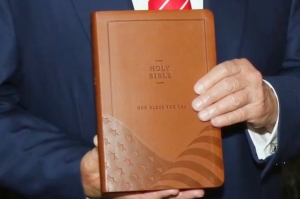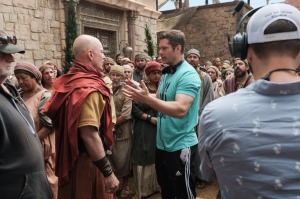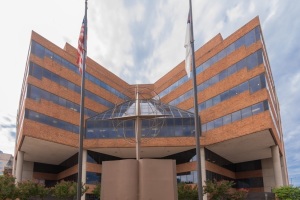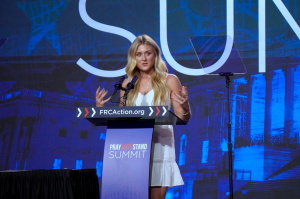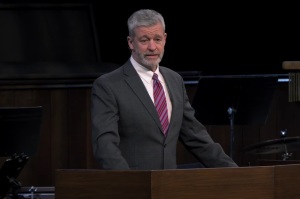William Barber retires from ministry, will focus on civil rights activism
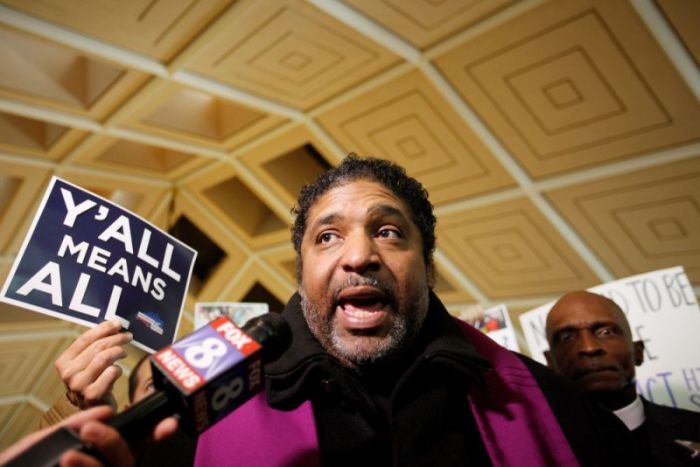
The Rev. William J. Barber II, a nationally known progressive Christian leader who gave a homily at President Joe Biden's inaugural prayer service and is one of the driving forces behind the Poor People's Campaign, has announced his retirement from ministry.
At a service held at Greenleaf Christian Church of Goldsboro, North Carolina, on Sunday morning, Barber preached a retirement sermon to the congregation where he served as pastor since 1993.
Barber, 59, who has suffered a severe type of arthritis known as ankylosing spondylitis since he was in his 20s, argued that a theme in Scripture is that "God does His best work with cripples."
"Every main character that you heard, read from 2 Corinthians to Isaiah to Matthew to Samuel, is crippled, broken, handicapped," said Barber. "Is that your story, too?"
"Somewhere in this room, there's not a person in here that does not have some crippling reality, some brokenness, some handicap. And yet, when you read the texts, in some ways, their stories testify to the glory of God."
The Rev. Teresa Hord Owens, president of the Disciples of Christ denomination, said during the service that Barber has "modeled what it means to be a congregationalist pastor."
"You could have turned your back on all of this work and gone off to large, ecumenical big tables, but you began the work and you continued the work here in this congregation," said Owens. "Greenleaf, your ministry has been a model to the rest of the Church."
"Bishop Barber, you have reminded the people that their call is to the least, the last and the lost. You have been an active member of our denomination, an active clergyperson, you have served as the moderator of this region. You have been connected to the Church. Again, a model of what it means to be part of this covenantal community."
Owens said that Barber, who supported her election as the first African American woman to head the denomination, has "always been an inspiration" to her and other clergy.
Although stepping down from the pulpit, Barber will continue to engage in civil rights activism, according to a statement from his congregation.
"He is dedicating his next season to continuing to build a moral movement that can redeem the heart and soul of this nation, usher in a third reconstruction, and, through his role as founding director of the recently established Yale Center for Public Theology and Public Policy, train a new generation of moral leaders to be active participants in creating a just society," the church said, according to CNN.
A former president of the North Carolina chapter of the NAACP, Barber garnered national attention for his weekly "Moral Monday" protests outside the state legislature in 2013. According to his online bio, over 1,000 peaceful protesters were arrested for participating in acts of civil disobedience.
In 2019, the Poor People's Campaign hosted a "Moral Action Congress" in Washington, D.C., where nine leading Democratic 2020 presidential hopefuls, including current President Joe Biden and Vice President Kamala Harris, offered their visions for the country.
In June 2022, the Poor People's Campaign led the "Mass Poor People's & Low-Wage Workers' Assembly and Moral March on Washington."
Barber has often voiced support for left-leaning causes, such as abortion, and was a strong critic of former President Donald Trump. In 2017, he remarked that faith leaders praying over Trump at the White House "borders on heresy."
Ahead of the 2020 presidential election, Barber also hosted openly gay Democratic presidential candidate Pete Buttigieg at his church and maintained that Jesus never spoke out against homosexuality.
Greenleaf Christian Church held a retirement banquet for Barber last week, during which a video message from Biden honoring Barber was shown, according to CNN.
"Thank you for showing all of us how to do justice, love mercy and walk humbly," Biden said. "I'll never forget your homily at my inaugural prayer service when you called on us to be repairers of the breach and heal the soul of the nation."
In an interview with The Christian Post in 2019, Barber denounced the idea that "the only moral issues discussed in the public square" be "where somebody stands on the LGBTQ issue, where they stand on the issue of women's rights, and where they stand on the issue of prayer in schools."
"What we want to hear candidates talk about from a moral perspective is where their policies line up when we're dealing with issues like systemic racism, voter suppression," Barber said.
"Where the candidates stand on the moral issue of ecological devastation and clean air, clean water. Where do politicians stand on the moral issue of how we fund war, the war economy and militarism."
Barber is one of the leaders behind the Poor People's Campaign: A National Call for Moral Revival, a coalition focused on issues like poverty relief that takes its name from a group founded by the Rev. Martin Luther King, Jr. shortly before his assassination in 1968.
In January 2021, speaking remotely for the Presidential Inaugural Prayer Service held for newly sworn-in President Joe Biden, Barber warned against what he called "simplistic calls for unity."
"Transposed to our time, the breach is when we say 'one nation, under God, indivisible with liberty and justice for all' with our lips, while we see the rich and the poor living in two very different Americas," Barber said.
"The breach would be knowing the only way to ensure domestic tranquility is to establish justice. It is pretending that we can address the nation's wounds with simplistic calls for unity. That is not how we can close the breach."
















